英语语用学论文
- 格式:doc
- 大小:37.00 KB
- 文档页数:9
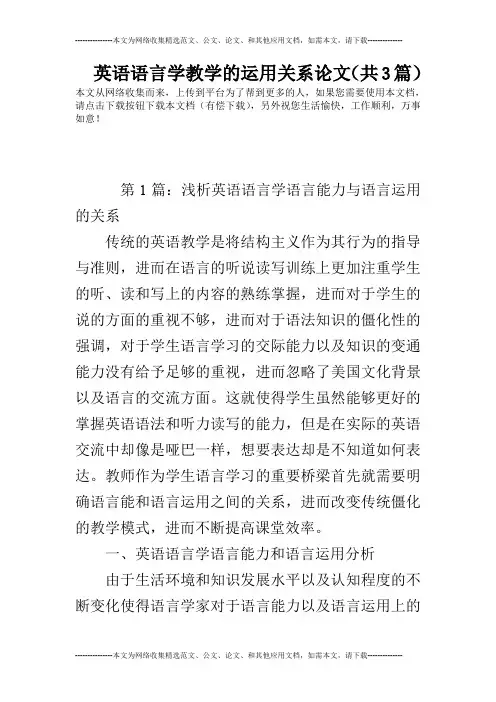
英语语言学教学的运用关系论文(共3篇)本文从网络收集而来,上传到平台为了帮到更多的人,如果您需要使用本文档,请点击下载按钮下载本文档(有偿下载),另外祝您生活愉快,工作顺利,万事如意!第1篇:浅析英语语言学语言能力与语言运用的关系传统的英语教学是将结构主义作为其行为的指导与准则,进而在语言的听说读写训练上更加注重学生的听、读和写上的内容的熟练掌握,进而对于学生的说的方面的重视不够,进而对于语法知识的僵化性的强调,对于学生语言学习的交际能力以及知识的变通能力没有给予足够的重视,进而忽略了美国文化背景以及语言的交流方面。
这就使得学生虽然能够更好的掌握英语语法和听力读写的能力,但是在实际的英语交流中却像是哑巴一样,想要表达却是不知道如何表达。
教师作为学生语言学习的重要桥梁首先就需要明确语言能和语言运用之间的关系,进而改变传统僵化的教学模式,进而不断提高课堂效率。
一、英语语言学语言能力和语言运用分析由于生活环境和知识发展水平以及认知程度的不断变化使得语言学家对于语言能力以及语言运用上的定义就有一定的出入。
在二十世界发展的早期,著名的语言学家索绪尔曾经对于“语言”和“言语”之间的概念进行了辨析,进而提出了语言与语言的管理存在很大的关系,也就是说语言能力是对于词汇、发音以及语法等硬性知识的掌握而进行的概括,并且语言可以被看作是言语在实际的社会活动之中的一种交流媒介,这是不经受人的意志上的支配,而是社会人员的一种基础的社会心理现象;但是言语则是对于语言的实际性运用,是每一个人的自由性的活动,其行为是受到自身的意志的支配,进而支配其在社会生活中能够运用语言的知识和语言的规则。
相反,通过对于言语的记录就能够实现对于语言的基本机构和形态的分析来举一反三的总结出该语言的实际使用规则。
语言并不是只是依靠后天的学习就能够获得的,还需要人类在先天就与之而来语言的学习能力的刺激才能够达到,这种能力由于后天的生活环境的影响就会使其内在的知识结构发生很大的改变,进而出现了所谓的语言能力和语言运用的区别。
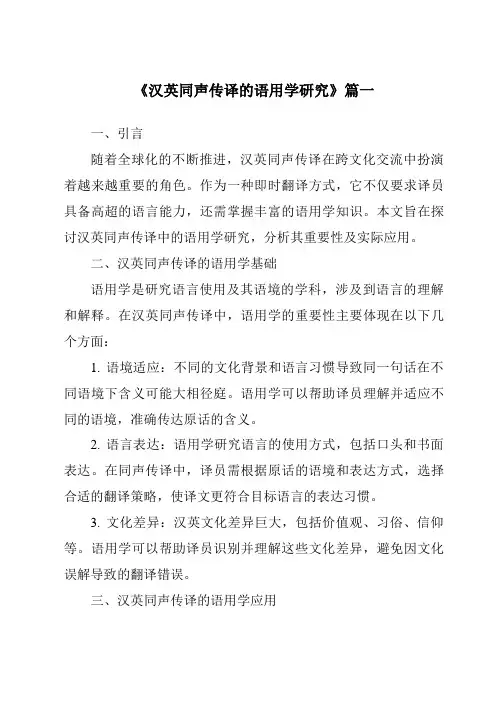
《汉英同声传译的语用学研究》篇一一、引言随着全球化的不断推进,汉英同声传译在跨文化交流中扮演着越来越重要的角色。
作为一种即时翻译方式,它不仅要求译员具备高超的语言能力,还需掌握丰富的语用学知识。
本文旨在探讨汉英同声传译中的语用学研究,分析其重要性及实际应用。
二、汉英同声传译的语用学基础语用学是研究语言使用及其语境的学科,涉及到语言的理解和解释。
在汉英同声传译中,语用学的重要性主要体现在以下几个方面:1. 语境适应:不同的文化背景和语言习惯导致同一句话在不同语境下含义可能大相径庭。
语用学可以帮助译员理解并适应不同的语境,准确传达原话的含义。
2. 语言表达:语用学研究语言的使用方式,包括口头和书面表达。
在同声传译中,译员需根据原话的语境和表达方式,选择合适的翻译策略,使译文更符合目标语言的表达习惯。
3. 文化差异:汉英文化差异巨大,包括价值观、习俗、信仰等。
语用学可以帮助译员识别并理解这些文化差异,避免因文化误解导致的翻译错误。
三、汉英同声传译的语用学应用1. 词汇选择:在同声传译中,词汇的选择至关重要。
译员需根据语境和目标语言的表达习惯,选择合适的词汇。
例如,在表达“面子”这一概念时,英文中的“honor”和“face”可能无法完全传达其含义,而需要结合具体语境选择更合适的词汇。
2. 句式转换:汉英句式结构存在较大差异,如汉语多意合,英语多形合。
在同声传译中,译员需根据目标语言的句式结构进行适当的句式转换,以使译文更符合目标语言的语法习惯。
3. 文化背景的补充:在翻译过程中,有时原话的某些含义可能难以通过语言本身传达。
此时,译员需借助文化背景进行补充说明,以帮助听众更好地理解。
例如,在翻译中国传统节日时,可简要介绍节日的起源、习俗等文化背景信息。
四、实证研究为进一步探讨汉英同声传译的语用学应用,本文进行了实证研究。
选取了若干汉英同声传译实例,分析译员在翻译过程中如何运用语用学知识解决实际问题。
研究发现,具备丰富语用学知识的译员在词汇选择、句式转换、文化背景补充等方面表现更佳,能够更准确地传达原话的含义。
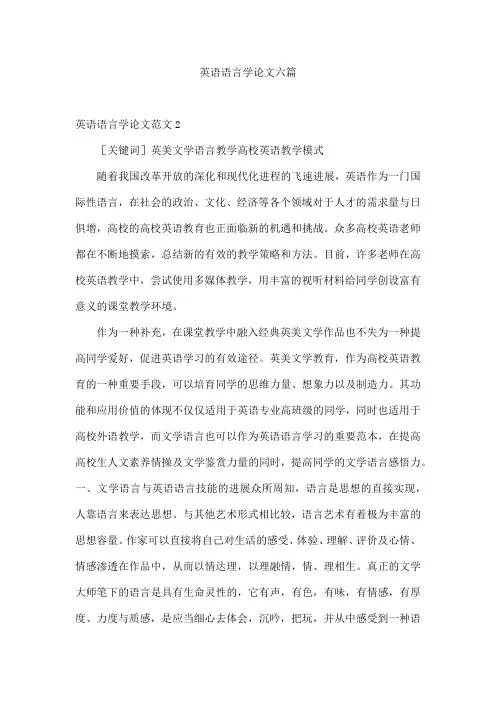
英语语言学论文六篇英语语言学论文范文2[关键词]英美文学语言教学高校英语教学模式随着我国改革开放的深化和现代化进程的飞速进展,英语作为一门国际性语言,在社会的政治、文化、经济等各个领域对于人才的需求量与日俱增,高校的高校英语教育也正面临新的机遇和挑战。
众多高校英语老师都在不断地摸索,总结新的有效的教学策略和方法。
目前,许多老师在高校英语教学中,尝试使用多媒体教学,用丰富的视听材料给同学创设富有意义的课堂教学环境。
作为一种补充,在课堂教学中融入经典英美文学作品也不失为一种提高同学爱好,促进英语学习的有效途径。
英美文学教育,作为高校英语教育的一种重要手段,可以培育同学的思维力量、想象力以及制造力。
其功能和应用价值的体现不仅仅适用于英语专业高班级的同学,同时也适用于高校外语教学,而文学语言也可以作为英语语言学习的重要范本,在提高高校生人文素养情操及文学鉴赏力量的同时,提高同学的文学语言感悟力。
一、文学语言与英语语言技能的进展众所周知,语言是思想的直接实现,人靠语言来表达思想。
与其他艺术形式相比较,语言艺术有着极为丰富的思想容量。
作家可以直接将自己对生活的感受、体验、理解、评价及心情、情感渗透在作品中,从而以情达理,以理融情,情、理相生。
真正的文学大师笔下的语言是具有生命灵性的,它有声,有色,有味,有情感,有厚度、力度与质感,是应当细心去体会,沉吟,把玩,并从中感受到一种语言的趣味性。
因此语言的背后是人的心灵世界。
对文学语言美的敏感与驾驭力量,是提高人的精神境界,使人变得更加美妙的不行或缺的方面。
文学阅读的魅力与意义也就在于此。
目前的高校英语教学,仍旧停留在传统的单纯课文教学,语言点讲解等层面上,课本内容相对陈旧,老师的教学手段也并无创新之处。
其弊端是忽视英语的基本功能即表达功能,也忽视了同学在教学活动中的主体作用,另外还忽视了对同学英语学习爱好的培育,将生硬的课本内容强行“灌输”;至同学脑海中,使整个课堂教学环节缺乏生气,长此以往,高校英语教学将陷入僵局。
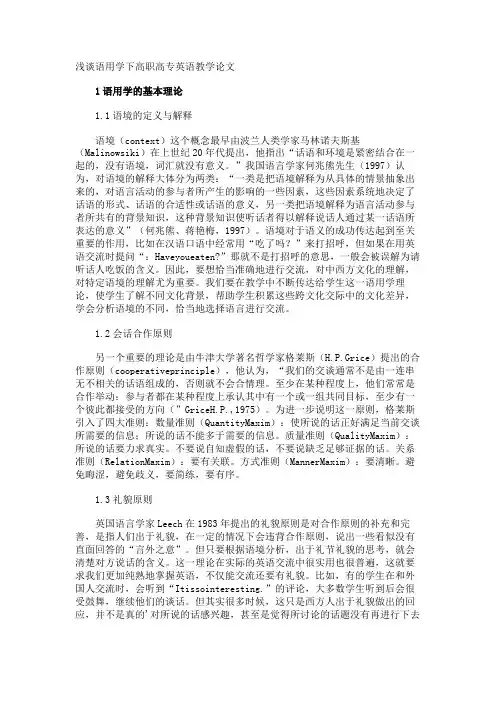
浅谈语用学下高职高专英语教学论文1语用学的基本理论1.1语境的定义与解释语境(context)这个概念最早由波兰人类学家马林诺夫斯基(Malinowsiki)在上世纪20年代提出,他指出“话语和环境是紧密结合在一起的,没有语境,词汇就没有意义。
”我国语言学家何兆熊先生(1997)认为,对语境的解释大体分为两类:“一类是把语境解释为从具体的情景抽象出来的,对语言活动的参与者所产生的影响的一些因素,这些因素系统地决定了话语的形式、话语的合适性或话语的意义,另一类把语境解释为语言活动参与者所共有的背景知识,这种背景知识使听话者得以解释说话人通过某一话语所表达的意义”(何兆熊、蒋艳梅,1997)。
语境对于语义的成功传达起到至关重要的作用,比如在汉语口语中经常用“吃了吗?”来打招呼,但如果在用英语交流时提问“:Haveyoueaten?”那就不是打招呼的意思,一般会被误解为请听话人吃饭的含义。
因此,要想恰当准确地进行交流,对中西方文化的理解,对特定语境的理解尤为重要。
我们要在教学中不断传达给学生这一语用学理论,使学生了解不同文化背景,帮助学生积累这些跨文化交际中的文化差异,学会分析语境的不同,恰当地选择语言进行交流。
1.2会话合作原则另一个重要的理论是由牛津大学著名哲学家格莱斯(H.P.Grice)提出的合作原则(cooperativeprinciple),他认为,“我们的交谈通常不是由一连串无不相关的话语组成的,否则就不会合情理。
至少在某种程度上,他们常常是合作举动;参与者都在某种程度上承认其中有一个或一组共同目标,至少有一个彼此都接受的方向(”GriceH.P.,1975)。
为进一步说明这一原则,格莱斯引入了四大准则:数量准则(QuantityMaxim):使所说的话正好满足当前交谈所需要的信息;所说的话不能多于需要的信息。
质量准则(QualityMaxim):所说的话要力求真实。
不要说自知虚假的话,不要说缺乏足够证据的话。
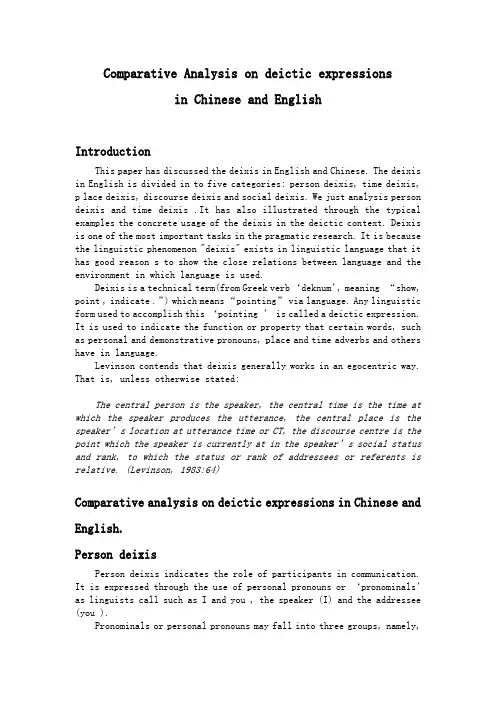
Comparative Analysis on deictic expressionsin Chinese and EnglishIntroductionThis paper has discussed the deixis in English and Chinese. The deixis in English is divided in to five categories: person deixis, time deixis, p lace deixis, discourse deixis and social deixis. We just analysis person deixis and time deixis .It has also illustrated through the typical examples the concrete usage of the deixis in the deictic context. Deixis is one of the most important tasks in the pragmatic research. It is because the linguistic phenomenon "deixis" exists in linguistic language that it has good reason s to show the close relations between language and the environment in which language is used.Deixis is a technical term(from Greek verb ‘deknum’, meaning “show, point , indicate .”) which means “pointing” via language. Any linguistic form used to accomplish this ‘pointing ’ is called a deictic expression. It is used to indicate the function or property that certain words, such as personal and demonstrative pronouns, place and time adverbs and others have in language.Levinson contends that deixis generally works in an egocentric way. That is, unless otherwise stated:The central person is the speaker, the central time is the time at which the speaker produces the utterance, the central place is the speaker’s location at utterance time or CT, the discourse centre is the point which the speaker is currently at in the speaker’s social status and rank, to which the status or rank of addressees or referents is relative. (Levinson, 1983:64)Comparative analysis on deictic expressions in Chinese and English.Person deixisPerson deixis indicates the role of participants in communication. It is expressed through the use of personal pronouns or ‘pronominals’as linguists call such as I and you , the speaker (I) and the addressee (you ).Pronominals or personal pronouns may fall into three groups, namely,the first person, the second person and the third person.As for the first person, person deixis encodes a distinction between the singular and plural. For example, in Chinese northern dialect, “wo men” is usually singular in meaning with reference to speaker(s) only while “zan men” is often plural in meaning with reference to both speakers and addressees. However, in modern English, there is only one word for “we”.If we are carefully enough, we shall notice that in some languages, the category of plural notion is not applied to the first person in the same way as it is to the person. Some languages even make a distinction between‘we–inclusive –of-addressee and ‘we-exclusive-of-addressee.’Such distinction may not be common in English, but dose exist in the contraction of ‘‘let’s’ and some other circumstances when reference to context is necessary. For example:1) Let us try again.2) Let’s go to the cinema.“Let us” in 1) is “we-exclusive-of-addressee” and is singular in meaning. While “let’s” in 2) is “we–inclusive –of-addressee”. It refers to both the speaker and addressee and is plural in meaning.As for the second person, Chinese has two different sets of pronouns , an informal one for use when talking to friends and a more formal one or honorific one used for showing respect to the addressees who are older or more important than the speaker, to show the distinction between the singular and plural. For example, there is a distinction between “ni” ,“ni men” and “nin”. The last is used when we are talking to people who are older or more important than us.In English, however, there is no such a distinction; “you” is used for both the singular and plural and is the only form that people use to refer to an addressee or addressees. In both spoken and written English , the second person pronoun “you” can be used to refer to anyone as in the following examples:You will never be successful until you do your best.As a matter of fact, only the first person and the second person are actually participating in the drama.The third person is defined negatively as neither the first nor the second, and dose not correlate with any positive participant role. Normally the third person pronoun is indicating neither the speaker/speakers nor addressee/addressees.The speaker and the addressee are necessarily present in the speech situation, whereas other persons and things to which reference is mademay be absent from the situation, they may be left unidentified. Time deixisTime deixis is a group of words that indicate time. Different language has different lexical means of expressing the concept of time. Time deictic expressions include time adverbs such as “this”, “last”, “next”, “week”, “month”, “year”, “now”, “then”, ”ago”, “later”“yesterday”,“today”, “tomorrow” and tense system.Pragmatic study of time deixis concerns the specification and understanding of temporal points relative to the time at which communication takes place. Like person deixis, time deixis also takes into account a point of origin or the base point.Due to the search for the point of view regarding time (or time origin) in understanding time deictic information, pragmatists have made a distinction between coding time (CT: the time when a message is formed) and receiving time (RT: the time when a message is received).Though making a list of time deixis in one language is relatively simple, the use of time deixis, however, is not always so straightforward.The topic of time deixis has been complicated by the interaction between its calendric and non-calendric.“Now” The time deixis “now” indicates two different time spans . One is the time at which the speaker is producing the utterances while the other is “the time which spans from CT (including CT) to a certain period after the CT. For example:I am working on a new project now.I’ll see you today“Then” contrasts with “now’ and indeed can be understood as “not now” so mean both past and future time. For example:I will have finished my university life thenAnother very important time deictic is the tense system. In fact, almost every sentence makes a reference to an event time. Often this event time can only be determined in relation to the time of the utterance. For example:1) China will hold the Olympics games in Beijing.2) China held the Olympics games in Beijing.3) China held the Olympics games in Beijing in 2008.Languages in the world differ in pre-emptive deictic terms for the days. For example, English has only a three-number set of pre-emptiveterms (“yesterday”, “today”, “tomorrow”); Mandarin Chinese has five (“qian tian”, “zuo tian”, “jin tian”, “ming tian”, “hou tian”) and so on.SummaryDeixis presents and shows the property of all pragmatic language use -----that of relying on the speaker ----hearer setting up a common context to which a very wide range of language uses can be interpreted.In this paper, we have briefly compared the differences of person deixis and time deixis in Chinese and English. At the same time, we also have briefly examined of pragmatic functions of some deictic items such as I, here, now, etc. We figure out the importance of the common and the difference in different language. We assume the addressee’s knowledge of the speaker’s identity (in the case of place deixis) in order to identity and understand the deictic information conveyed by these lexical items in communication.In the whole process, we have gradually come to realize that the literal meanings and the referents of deictic items are different in different countries and languages and may vary under different contexts. So it’s very important for us to analysis the deixis in varied perspectives providing different countries’ culture backgrounds.。
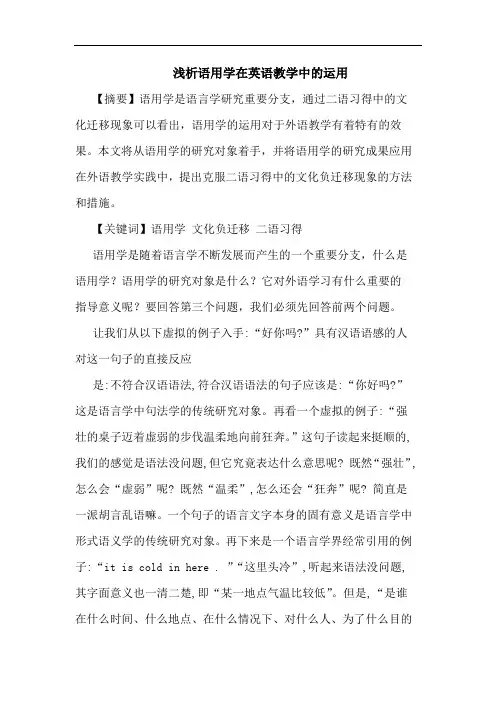
浅析语用学在英语教学中的运用【摘要】语用学是语言学研究重要分支,通过二语习得中的文化迁移现象可以看出,语用学的运用对于外语教学有着特有的效果。
本文将从语用学的研究对象着手,并将语用学的研究成果应用在外语教学实践中,提出克服二语习得中的文化负迁移现象的方法和措施。
【关键词】语用学文化负迁移二语习得语用学是随着语言学不断发展而产生的一个重要分支,什么是语用学?语用学的研究对象是什么?它对外语学习有什么重要的指导意义呢?要回答第三个问题,我们必须先回答前两个问题。
让我们从以下虚拟的例子入手:“好你吗?”具有汉语语感的人对这一句子的直接反应是:不符合汉语语法,符合汉语语法的句子应该是:“你好吗?”这是语言学中句法学的传统研究对象。
再看一个虚拟的例子:“强壮的桌子迈着虚弱的步伐温柔地向前狂奔。
”这句子读起来挺顺的,我们的感觉是语法没问题,但它究竟表达什么意思呢? 既然“强壮”,怎么会“虚弱”呢? 既然“温柔”,怎么还会“狂奔”呢? 简直是一派胡言乱语嘛。
一个句子的语言文字本身的固有意义是语言学中形式语义学的传统研究对象。
再下来是一个语言学界经常引用的例子:“it is cold in here . ”“这里头冷”,听起来语法没问题,其字面意义也一清二楚,即“某一地点气温比较低”。
但是,“是谁在什么时间、什么地点、在什么情况下、对什么人、为了什么目的使用了这句句子”。
(何兆熊,1989 :13) 就不是传统的句法学和语义学所能解决的问题,因为“说话人很可能是为了请听话人做点什么,比如关上门窗,打开暖气,借件衣服御寒等。
”(同上,1989 :14) 换句话说,这里要研究的不是句子本身的意义, 而是研究“语言在使用中的意义” ,“语言在语境中的意义”,归根结底是“说话人的意义”,也可简称为“话语意义”。
(何自然,1997 :122) 这就是语用学(pragmatics) 的研究对象。
以上只是对语言学中三个重要分支句法学、语义学、语用学的研究对象进行了粗略划分。
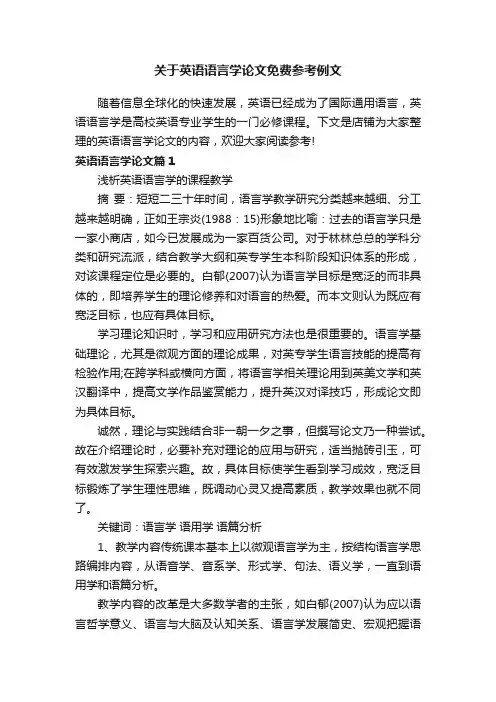
关于英语语言学论文免费参考例文随着信息全球化的快速发展,英语已经成为了国际通用语言,英语语言学是高校英语专业学生的一门必修课程。
下文是店铺为大家整理的英语语言学论文的内容,欢迎大家阅读参考!英语语言学论文篇1浅析英语语言学的课程教学摘要:短短二三十年时间,语言学教学研究分类越来越细、分工越来越明确,正如王宗炎(1988:15)形象地比喻:过去的语言学只是一家小商店,如今已发展成为一家百货公司。
对于林林总总的学科分类和研究流派,结合教学大纲和英专学生本科阶段知识体系的形成,对该课程定位是必要的。
白郁(2007)认为语言学目标是宽泛的而非具体的,即培养学生的理论修养和对语言的热爱。
而本文则认为既应有宽泛目标,也应有具体目标。
学习理论知识时,学习和应用研究方法也是很重要的。
语言学基础理论,尤其是微观方面的理论成果,对英专学生语言技能的提高有检验作用;在跨学科或横向方面,将语言学相关理论用到英美文学和英汉翻译中,提高文学作品鉴赏能力,提升英汉对译技巧,形成论文即为具体目标。
诚然,理论与实践结合非一朝一夕之事,但撰写论文乃一种尝试。
故在介绍理论时,必要补充对理论的应用与研究,适当抛砖引玉,可有效激发学生探索兴趣。
故,具体目标使学生看到学习成效,宽泛目标锻炼了学生理性思维,既调动心灵又提高素质,教学效果也就不同了。
关键词:语言学语用学语篇分析1、教学内容传统课本基本上以微观语言学为主,按结构语言学思路编排内容,从语音学、音系学、形式学、句法、语义学,一直到语用学和语篇分析。
教学内容的改革是大多数学者的主张,如白郁(2007)认为应以语言哲学意义、语言与大脑及认知关系、语言学发展简史、宏观把握语言学真正意义等四方面为重。
还有学者认为增加课外阅读材料以改进教学内容,如王扬(2004)和吴格奇(2005)主张选用有助于学生理解基本理论、概念的材料、辅之以拓宽视野的补充材料。
还有以宏观还是微观语言学内容作为教学重点的争论:“微观”派认为语言内部分支是语言学的基础内容,课时分配比重要大;“宏观”派认为基础部分简单,学生可自学,重点应是宏观介绍;“中间”派是既注重基础又考虑涉猎面。
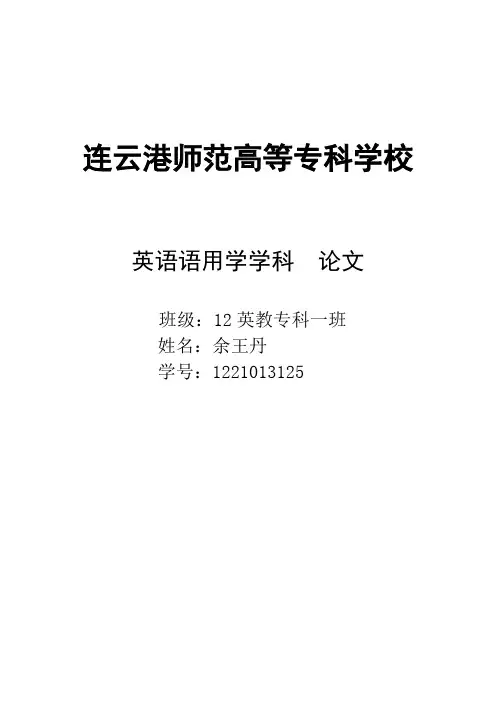
连云港师范高等专科学校英语语用学学科论文班级:12英教专科一班姓名:余王丹学号:1221013125摘要:本文主要从语用学的角度对语言交际中的礼貌现象进行了研讨,以旨更全面地展示语用礼貌观。
本文共分四部分:一、礼原则的由来;二、礼貌原则的解析;三、礼貌策略;四、礼貌原则的应用。
加深对礼貌原则的理解可以有助于提升自身的语用能力。
关键词:语用学礼貌原则教学应用一、礼貌原则的由来(一)礼貌的界定在众多关于礼貌的各种文献中,围绕“礼貌”一词进行的研究主要有五个方面,具体如下:(1)礼貌是人们在交际中的一种现实目的(Politeness as areal-world goa1)。
人们在说话过程中运用礼貌原则的目的就是取悦他人。
(2)礼貌是一种敬重(Politeness as the deference)。
(3)礼貌是一种语体(Politeness as the register)。
语体是指“与社交语境有关的系统化变体”(Lyons,1977)。
或者指在一定场合下人们说话或写作时的语言变化(Holliday,1978)。
(4)礼貌是一种话语表层现象(Politeness as an utterancelevel phenomenon)。
该观点认为,礼貌是一种表层语法编码,该观点主要是离开语言运用的实际环境去研究礼貌问题。
(5)礼貌是一种语用现象(Politeness as a pragmatic phi—nominee)。
该观点在语用学界已经成为人们的一种共识。
总之.在语用学领域,人们关心的不是说话人是否真正对他人友善,而是他说了什么,以及他的话语对听话人产生了什么影响。
把礼貌看成敬重、语体,是一种社会语言学现象,不属于语用学的范围,而把礼貌看成一种话语表层现象,就是脱离了语境去谈礼貌,这是一种超理想化的理论,因为语言形式是和语境、说话人和听话人之间的关系紧密联系的。
(二)礼貌原则提出的必要性在英语语用学习领域中,提及言语行为理论(Speech Act Theory).人们会很自然地联想到美国语言哲学家格赖斯(H.P.Grieve)的会话含义学说(Convocational Implicate),即为了保证会话的顺利进行,谈话双方必须共同遵守一些基本原则,尤其是用来解释会话结构的“合作原则”(Cooperative Principle)。
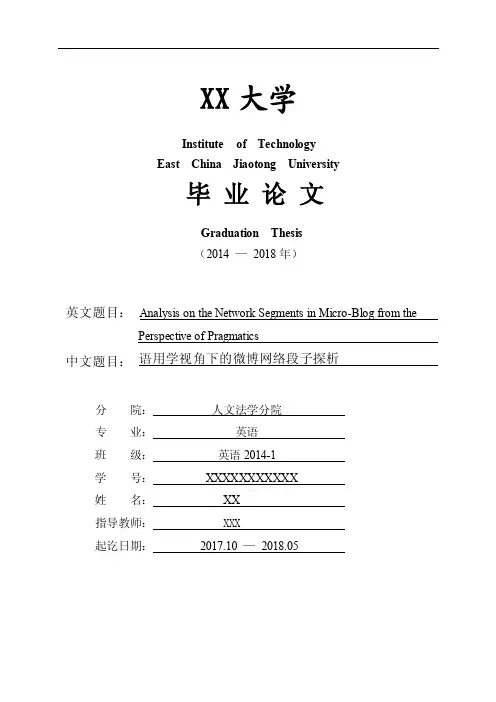

语言学论文-语用学Comparison between Chinese and EnglishIdiomsAbstract: Idioms exist in both Chinese and English, and they have been used frequently for a long time. Furthermore, idioms are fixed phrases extracted from language over long time of usage. Although they are formed in short phrases, for example idioms known as “成语” in Chinese, which has only four or eight letters, their meanings are exuberant and connotative. Therefore, the analysis of the idiom’s usage and the cultural differences it reflects is significant to every language learner and translator.Key words: idiom; culture;comparison; differences1 Theoretical Foundation of the Idiom1.1 Definitions of Chinese IdiomsAccording to “Modern Chinese Dictionary”, “Cheng yu”is fixed phrases or short sentences which are concise, having been accepted by common people through years of usage.According to “Cihai”, “Shuyu”(Idiom) is fixed phrases or sentences of a language, which cannot be modified arbitrarily. It must be interpreted as a semantic unit. It includes set phrases, proverbs, maxims, locutions and two-part allegorical sayings, etc.1.2 Definitions of English Idioms“Longman Dictionary of English Language and Culture”has two definitions of idiom: (1) a phrase which means something different from the meaning of the separate words from which it is formed; (2) the way of expression typical of a person or a group in their use of language (Summers P., 1998: 657).“Th e New Oxford English Dictionary”defines that idiom is:(1) a group of words established by usage as having a meaning not deducible from those of the individual words; (2) a form of expression natural to a language, person, or a group of people (Pearsall J, 2001:908).1.3 The Rhetoric of IdiomsIdiom is the distillate of the nation language abstracted bypeople during a long practice. There are three main features of idiom rhetoric: abundant comparisons, vivid words and lively contrasts.First, simile is a direct comparison, in which subject, reference and indicator of resemblance are all present. Such as the Chinese idiom “轻如鸿毛” and the English idiom “as light as a feather”.Second, metaphor—use of a word or phrase to indicate something different from the literal meaning. For example, the Chinese idiom “口若悬河”,it doesn’t mean the river hang on the mouth, but means someone who speaks eloquently and volubly.Third, metonymy—means correspondence or partial similarity between two things that are compared. For instance, “犬马之劳”means to sever somebody faithfully like the dog or the horse. “be in the pipeline”means that if a plan is in the pipeline, it is being developed and will happen in the future.Fourth, analogy is to compare two things or people so that differences are made clear. “口蜜腹剑”literally means someone is honey-mouthed but dagger-hearted. That is to say the person is treacherous and hypocritical. “To bite the hand that feeds one”also uses the contrast. It means to treat someone badly who has helped you in some way.F ifth, exaggeration such as “垂涎三尺” exaggerated means a drool with great envy. “A stream of tears”means someone is really heart-broken.is revealed, like the denotative meaning of words, especially for those culturally-loaded words like idioms. Idioms have a close relationship with the culture to which it is attached that they truly reflect the values and philosophy of life of the people in that culture and are rich in cultural connotations.Comprehension of the Exotic IdiomsThere are some exotic idioms in the Chinese idioms. Such as “以眼还眼”comes from the English idiom “an eye for an eye”. This idiom which comes from the Bible means that if someone does something wrong, they should be punished by having the same thing done to them. And another Chinese idiom “诺亚方舟”, “Noah’s ark” also comes from the Bible.The English idiom “An Achilles’heel” means a small fault in a person or system which might cause them to fail. This idiom is from Greek mythology. Achilles was a man who was killed when he was injured on his heel, because this was the only part of his body where he could be harmed.Therefore, idioms can be an effective tool of learning culture. And learning culture items like idioms can be one of the good examples to learn both language and culture simultaneously. Learning idioms can also make us learn more about the knowledge of cultural background.2 Compare Chinese Idioms with English Idioms2.1 Similarities between Chinese and English IdiomsAs human civilization has developed in a similar way, both English and Chinese idioms are similar in basic moral concepts and value viewpoint, which has formed a common base for both cultures. Their similarities are as follows: First, in both English and Chinese we have alike idioms to express the hard-working, brave and indomitable human nature and the good will and forgiveness. Also there are many idioms in both languages to praise the pi oneering spirit. For example, “既往不咎, Let bygones be bygones”, “心安理得, Have peace of mind”, “有志者,事竟成, Where there is a will, there is a way”, “有始有终, From beginning to end”, etc. Second, those idioms in both English and Chinese to expr ess verities are same. Such as “眼见为实, Seeing is Believing”,etc. Third, the same imagination in both English and Chinese has the same comparison in the idiom. For instance, “轻如鸿毛, As light as a feather”, “冰清玉洁, Be as clear as crystal”, etc.The above similarities are essential to the intercultural communication. Different cultures may conflict in many aspects, but must agree on basic morals and value points. Only by agreeing on basic morals and value points, can cultural conflicts be limited in a tolerable level and intercultural communication carried out.2.2 Differences between Chinese and English Idioms2.2.1 Differences in Animal-related IdiomsAnimals are friends of human. They have so many links withhuman beings and human languages. Before the arrival of modern civilization, sometimes even today, the basic necessities in human life such as food, clothing and transportation and so on are obtained directly or indirectly from various animals. Among all kinds of animals, dogs are particularly valuable in protecting property, finding things and hunting quarries. Pigeons have long been used to deliver messages. Of course, some animals can also do harmful things to human beings, such as wolf, mice, etc., but no matter what they do, whether good or bad, animals are closely related with the daily life of human beings including everyday speech and animal-related idioms are come into being.Dog in most of the English idiom symbolizes the lay folk as “guy”. There is no d erogatory sense in it, such as “a lucky dog 幸运儿”, “love me, love my dog 爱屋及乌”, “help a lame dog over a stile 助人渡过难关”, etc. Of course, there is a little derogatory sense of dog used in idioms to describe the useless, woeful thing. For example, “ a dog in the manager 占着位子不做实事”, “ lead a dog’s life 过着可悲的生活”, etc. On the contrary, in Chinese idiom dog is used to describe beggarliness. Therefore, most of the dog related Chinese idiom is derogatory, like “狗急跳墙—a cornered be ast will do something desperate”, “狗尾续貂—a wretched seq uel to a fine work, incongruous”, “蝇营狗苟—shamelessly seek personal gain”, and others like “狗血喷头,狗仗人势,狗咬狗” etc.Differences in Color-related IdiomsThere are many idioms related to color both in Chinese and English, such as black (黑) and white (白); Black actually is the complete absorption of all light, while white is opposite to black. Therefore, in idioms Black and White also stand on two extreme points. As the original meaning of the black and white, they have the same expression in both Chinese and English idioms, such as “black and white 黑白分明”, “in black and white 白纸黑字”, “turn black into white 颠倒黑白”, etc. But there are some differences in their transferred meaning.In English idiom, black is used to describe atrocity, death and ominous thing, l ike “black sheep 害群之马”, “a black day 不吉利的日子”, etc. But sometime black also has a commendatory usage, such as “a business in the black 盈利的事业”. White in English idiom means chastity, integrity and elegance, for instance “a white lie 善意的谎言”, “the white day 良辰吉日”, and they have the “ white wedding”.In Chinese idiom, black is only used to describe incorrect, bad and criminal thing, for example, “心黑手狠—heartless and cruel”, etc. White in Chinese idiom is unlike its using in English idiom. It represents dreariness, poor and bereavement, for example, “白手起家—start something from scratch”, “一穷二白—poor and blank”, “红白喜事—wedding and bereavement”, etc.(潘红, 2005:209)Differences in Numeral-related IdiomsNumber, as an important part of language, is embodied withdifferent cultural background. Idioms with numbers are the central core and cream of languages, reflecting the wisdom of human kind. They have strong ethnical, historical and regional colors, reflecting the culture difference of different nationalities.To analysis numbers in both Chinese and English idioms, I find that the substantive meaning of number in both Chinese and English idioms is same. For example, “一心一意—whole-heartedly”, “one thing leads to another—一环扣一环”. Furthermore, in English idioms most of the numbers, except the number three and seven, are used as a substantive. It’s the biggest difference between Chinese and English numeral-related idiom. Because expect the substantive meaning of numbers in Chinese idiom, there are many abstractive meaning of numbers used in Chinese. First, the abstractive meaning of number in Chinese always expresses “more”or “less”. For example, one, half and “寸” are used to express “less”, like “一无所长—have no special skill”, “手无寸铁—unarmed”, etc. While three, five, six and nine are used to express “more”, nothing to say hundred and thousand, such as “三头六臂,三令五申,成百上千”, etc. Second, the numb er ten and one sometimes means “whole or all”, such as “十全十美—be perfect in every way”, “一如既往—just as in the past”. Third, two numbers in the same idiom usually express a transformation or a proportion, such as “三长两短—unforeseen accidents”, “十拿九稳—be very sure of success”, “百无一是—have no merits at all”. Fourth, some idioms arecustomarily be used, such as “一退六二五—deny all responsibility”and “不管三七二十一—regardless of the consequences”.(吕叔湘, 2002: 198) They are come from the custom of the counting frame which we used in ancient for counting numbers.In summary, from what is discussed above, we know that numbers play important roles in human cultures. They have strong connotations in both English and Chinese cultures.2.2.4 Differences in Mythology-related IdiomsThere are numerous idioms related to myths in English and Chinese. In English idioms, idioms of mythical origins are mainly from Greek and Roman mythology, which originating from their worship of the nature by Greek and Roman ancestors. Similarly, in Chinese idioms, mythology is generally of Chinese origin. These idioms reflect the formation of Chinese Culture in the primitive stage. They show a full scope of primitive recognition of the world.Take “dragon 龙”for example, dragon is a frequenter in both Chinese and English Myths, so there are many mythical idioms related to dragon. However, the associated meaning of dragon and 龙are opposite. In English, dragon connotes “a terrible fire-breathing monster”or “a giant that eats man”. According the famous legend “Beowulf”, a dragon that had three heads and could breathe fire guarded treasure for the “devils”. So dragon is always associated with devil. In the medieval times,“dragon”was associated with “sin”and it was the symbol of “heresy”. Nowadays, there is the idiom “chase the dragon—means take drugs”, so we can see how evil the dragon is in the westerners’ view.The opposite associated meaning of dragon in Chinese is always a commendatory. First, we see dragon is the totem of the Chinese people. We call ourselves the descendants of dragon proudly, such as “龙的传人”and “龙子龙孙”. Second, dragon in Chinese is associated with “emperor”, because emperors always name themselves as “真龙天子—the god’s son not the devil’s”. Third, dragon is associat e with “talent”, such as the id iom “龙生龙子,虎生豹儿—means talented perso n’s descen dants must be prominent”. Fourth, dragon is also associated with "good luck and success", such as “龙凤呈祥—means good luck”, and “望子成龙—means people hope their children can get success”, etc.3: ConclusionThrough the comparison between Chinese and English Idioms, their differences and similarities are obvious. This is meaningful and helpful for every language learners and users.References:[1] Alfred Lord Tennyson. Poems [M].Cambridge Press.2001.[2] Nida nguage,culture and translation [M].ShanghaiForeign Language Education Press,2000.[3]Pearsall J. The New Oxford English Dictionary [M].Oxford University Press,2001.[4] Summers P. Longman Dictionary of English Language andCulture[M].Longman Press,1998.[5] 辞海编辑委员会.辞海[M].北京:商务印书馆,1989.[6] 胡文仲.英美文化辞典[M].上海:外语教学与研究出版社, 1995.[7] 李娅玲.英语成语中色彩词汇的文化特征[J].怀化师专学报,1999(12).[8] 吕叔湘.现代汉语大辞典[M].北京:商务印书馆,2002.[9] 潘红.英汉国俗词语例话[M].上海:上海外语教育出版社, 2005.。
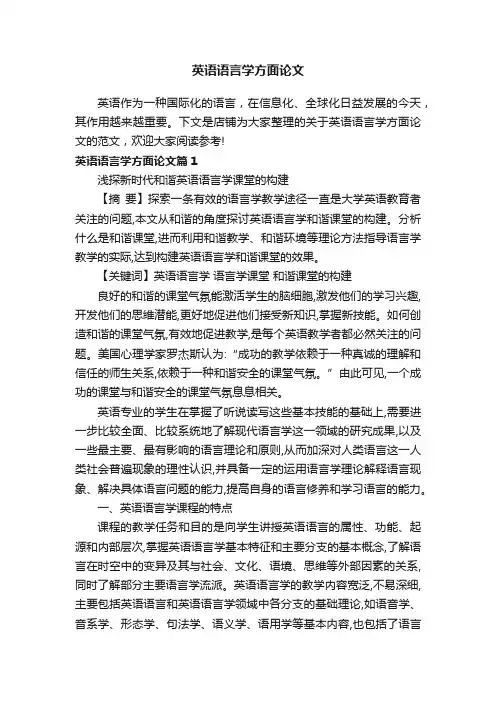
英语语言学方面论文英语作为一种国际化的语言,在信息化、全球化日益发展的今天,其作用越来越重要。
下文是店铺为大家整理的关于英语语言学方面论文的范文,欢迎大家阅读参考!英语语言学方面论文篇1浅探新时代和谐英语语言学课堂的构建【摘要】探索一条有效的语言学教学途径一直是大学英语教育者关注的问题,本文从和谐的角度探讨英语语言学和谐课堂的构建。
分析什么是和谐课堂,进而利用和谐教学、和谐环境等理论方法指导语言学教学的实际,达到构建英语语言学和谐课堂的效果。
【关键词】英语语言学语言学课堂和谐课堂的构建良好的和谐的课堂气氛能激活学生的脑细胞,激发他们的学习兴趣,开发他们的思维潜能,更好地促进他们接受新知识,掌握新技能。
如何创造和谐的课堂气氛,有效地促进教学,是每个英语教学者都必然关注的问题。
美国心理学家罗杰斯认为:“成功的教学依赖于一种真诚的理解和信任的师生关系,依赖于一种和谐安全的课堂气氛。
”由此可见,一个成功的课堂与和谐安全的课堂气氛息息相关。
英语专业的学生在掌握了听说读写这些基本技能的基础上,需要进一步比较全面、比较系统地了解现代语言学这一领域的研究成果,以及一些最主要、最有影响的语言理论和原则,从而加深对人类语言这一人类社会普遍现象的理性认识,并具备一定的运用语言学理论解释语言现象、解决具体语言问题的能力,提高自身的语言修养和学习语言的能力。
一、英语语言学课程的特点课程的教学任务和目的是向学生讲授英语语言的属性、功能、起源和内部层次,掌握英语语言学基本特征和主要分支的基本概念,了解语言在时空中的变异及其与社会、文化、语境、思维等外部因素的关系,同时了解部分主要语言学流派。
英语语言学的教学内容宽泛,不易深细,主要包括英语语言和英语语言学领域中各分支的基础理论,如语音学、音系学、形态学、句法学、语义学、语用学等基本内容,也包括了语言的变异及其与外部因素的关系。
二、英语语言学的授课对象英语语言学教程的授课对象是学习英语的高等院校学生,因此在讲解过程中大部分采用了英语。
Pragmatic Vagueness in Verbal CommunicationAbstract:Pragmatic vagueness is a common phenomenon in verbal communication. Combined with the existing achievements, the thesis attempts to analyze the phenomenon of pragmatic vagueness, pragmatic vagueness as a strategy in verbal communication and its pragmatic functions in verbal communication from the perspectives of cognitive pragmatics and sociolinguistics, in English examples, in order to prove the necessity of pragmatic vagueness as a communicative strategy. That is, for its pragmatic functions, the communicators make widely use of pragmatic vagueness in order to realize their communicative intentions and achieve successful communication.Key words: pragmatic vagueness, pragmatic functions ,strategyⅠ. IntroductionAs the research on pragmatics is deepened, many scholars conducted research on pragmatic vagueness. Pragmatic vagueness is an important pragmatic strategy. The research on pragmatic vagueness in verbal language is intriguing, realistic and useful. Verbal language is not only useful for its parishioners but also for English learners.In daily communication, people sometimes use precise language to express their ideas, but more often people prefer to use vague language to convey information. Vagueness is completely intrinsic in human language and the frequent use of hedges just fully testifies this inborn nature of language. The use of hedges is a common phenomenon in language communication. Therefore, the appropriate use of hedges in interaction can enhance the expressive force and communicative effect of language, making the expressions more natural, decent, polite, flexible, and effective. Moreover, the right use of hedg es can send people’s emotion and ideas more properly thereby helps to maintain a good interpersonal relationship between the two parties in communication and achieve the communicative goal successfully.Ⅱ. Pragmatic VaguenessCommunication falls into three categories in terms of conversational analysis: literal talk, loose talk and metaphorical talk. Indeed, most people’s conversation in daily life is loose in verbal communication, to some extent, carrying approximation,fuzziness, generality, ambiguity, ambivalence. In addition, daily conversation usually carries connotative expression such as metaphor, meiosis, irony and hyperbole. (He Ziran, 2000:8) The peripherical meaning or range error manifested in pragmatics is called generality or vagueness. (He Ziran, 1990:8) From what these scholars discussed above, we know that pragmatic vagueness in communication is very important.(a)Being a strategy of communication, pragmatic vagueness relies on various linguistic structures to realize its functions. Thus, the addressor needs to manipulate her language so as to choose a proper linguistic structure which can carry out her strategy. Through careful observation of the data, we generalize three ways of linguistic manipulation involved in the strategy of pragmatic vagueness, namely, enhancing the context-dependency of the utterance, broadening the interpretative range of the utterance, widening the distance between the idea and its way of expression. Furthermore, some specific linguistic devices are included in each category. Thus, the variability of pragmatic vagueness is demonstrated through its ways of linguistic manipulation.Ⅲ.Pragmatic Vagueness as a Strategy in Verbal CommunicationAs we all know, verbal communicative activities requires linguistic technique and diction of words. Due to different ideology and value, there are always different views on the same issue which is a common phenomenon. Therefore, verbal language is a vital strategy to achieve success in communicative activities.Vagueness is a traditionally focused topic of the study of epistemic theory as well as semantic theory about which there have appeared a large quantity of articles, and among which semantic factors are highly involved and consequently cognitive factors are seldom taken into account. Couched within Sperber and Wilson’s (1986/1995) Relevance Theory, the thesis makes the claim that pragmatic vagueness is a linguistic choice and a communicative strategy chosen by interlocutors to achieve optimal relevance.(b) The author, based on the relevant discussions on vagueness at home and abroad in recent years, makes a systematic analysis of pragmatic vagueness in the new light of cognitive pragmatics with passing comments on the limitations of the explanations provided by epistemic theory,semantic theory, speech act theory and Co-operative Principle. Linguistic devices at different levels such as phonology, lexicon, rhetoric and speech act work as pragmatic vagueness triggers to facilitate the search for optimal relevance. The conclusion is that pragmatic vagueness conforms to the Principle of Relevance in that it can achieve the greatest cognitive effects with the least processing efforts. The communicative functions of pragmatic vagueness include giving right amount of information, expressing the addresser’s propositional attitude, manipulating the focus of the addressee’s attention and achieving humorous and polite effects. Appropriate use of pragmatic vagueness as a communicative strategy is of positive significance to the development of learners’pragmatic competence and the avoidance of pragmatic failure.IV. Communicative functions of vaguenessLanguage is for communication, whereas vagueness may lead to better communication. Using vagueness can avoid being presumptuous in language communication. When we have to touch some topics that are unpleasant, we tend to choose more vagueness expressions to refer to those painful topics so as not to hurt the hearer’s fee ling. We can find the theoretical foundation for this motivation in Leech’s Politeness Principle. Vagueness just minimize the impoliteness and maximize the politeness in communication. The functions of vagueness are in agreement with those of Politeness Principle too, as they both offer more benefit to the hearer and leave more cost to the speaker, with the purpose that both of the two sides will feel respected and have favorable impression of each other. As politeness is usually regarded as the manifestation of human civilization, euphemism is one of the most effective strategies to display politeness while modulating interpersonal relationship in human communication.SubstitutionAccording to the definitions of vagueness and we know that a great number of English vagueness serve as the substitutions for verbal taboos. The term taboo ( ta meaning “mark”, boo meaning “exceedingly”) of Polynesian origin denotes anything linguistic and nonlinguistic, which is prohibited or forbidden.(c) Taboo refers to the situation in which a word or name can be used in a community only under special conditions, whether only by certain persons or only in certain circumstances. Just as violating a cultural taboo can be quite offensive, so is it with a verbal taboo in pressc onferences. The “word” has been and continues to be in most societies perceived as a powerful instrument that may evoke evil spirits, make bad things happen and instigate to violence and revolution and numerous other activities. While taboo of words occurs when a particular topic is considered valid for discussion, vagueness expression or terms are required. Diplomatic vagueness has a very serious reason for being. They can conceal the things people fear most —death, the dead or the supernatural. Euphemisms can also eliminate unhappiness, embarrassment and fear etc. so as to relieve people psychologically.PolitenessPoliteness is another very important function that vagueness serve in social life. “Some of the vagueness is used to avoid crudeness and indecency for the sake of a polite conversation”. (d) Grice formulated Cooperative Principle of utterance in which the Maxim of Manner was defined as “Be perspicuous and specific; To avoid obscurity; To avoid ambiguity; To be brief and to be order ly.”(e)The roundabout nature of vagueness goes against the Maxim of Manner, which can only be fairly explained well by Leech’s Politeness Principle “Approbation Maxim: minimize dispraise of other, maximize praise of other”. (f) In other words, euphemisms are to minimize impolite expressions and maximize polite expressions.DisguiseBesides the two functions of vagueness mentioned above, there is still another one more important function at work in vagueness communication, namely, the Disguise Function. Here we mean that because of the vagueness of, vagueness it has become a very important tool for political leaders or the diplomats or statesmen to distort the facts or and present a false picture of peace and prosperity and to beautify whatever the authority have do ne. For example, in the Iraq War, they use “Operation Iraqi Freedom” for beautifying their military invasion, “possible movement” refers to military attack, “air operation” or “air strikes” for air attack, “enter the war” to show their reluctance to fight the war etc.(g) and we may find many such kind of these vagueness in press conferences. The most important and ultimate function or purpose of the use of diplomatic vagueness in press conferences is to disguise or beautify their invasive essence or other evil actions or the separation of words from truth. In American and British societies nowadays, diplomatic vagueness are always purposely devised to disguise scandals in wars and politics, deliberately invented to beautify lowly occupations and excessively inflated to promote sales in advertisement.V. ConclusionAs we stated earlier, vagueness is one of the important and universal linguistic phenomena. Due to the special characteristics like substitution, indirectness etc. it is becoming one of the main communicative approaches. The thesis has attempted to study the vagueness expressions used in the question-answer patterns from the perspective of pragmatics.The article is an overview of the functions and communicative functions of vagueness, and from the pragmatic analysis of the materials, it can be seen clearly that the use of vagueness basically violate the Quality Maxim, the Quantity Maxim, and the Manner Maxim of the Cooperative Principle and the frequency of violating the Quality Maxim is the highest among the three ones. That is to say, the vagueness used in the question-answer patterns generally does not violate the Relation Maxim of the Cooperative Principle.There is an old saying in English: Necessity is the mother of invention. The creation of vagueness also cannot depart from people’s needs of them. People need vagueness for social communication, to vagueness the taboo, to show their politeness and to disguise. As a sociolinguistic phenomenon, the formation of vagueness is the result of the combination of various social psychological factors and pragmatic factors.Studies on vagueness from a pragmatic perspective reveal how vagueness flout the Cooperative Principle so as to obey the Politeness Principle in communication and how factors from their socio cultural and communicational context influence their application in communication. Any change of one or more factors of a communication event, will have an effect on our decision of whether to use vagueness. The expressive vagueness plays a non-fungible role in communication. It is vagueness that makes language more powerful, magical and pleasant. People’s speech does reflect their background, their activities, and the values they hold, therefore, we can learn much about the English people by looking at their use of vagueness. The studies on English vagueness can not only help to develop intercultural communicative competence, but also enlighten English language learning and teaching. Therefore, multidisciplinary, multi-angle, and multi-level studies on vagueness are necessary for English learners to understand the English history and society and communicate with native English speakers better. There are still a lot in this field waiting to be explored, and vagueness deserve more attention and comprehensive studies.References:1.Brown, P and Levinson,S.1978. “Universals in language Usage: Politeness Phenomena”. In Goody, E, N. (ed.): Questions and Politeness. Cambridge: Cambridge University Press. 56-310.2.Channell, J. 1994 Vague Language. Oxford: Oxford University Press.3.Ellis, R. 1985. Understanding Second Language Acquisition. Oxford: Oxford University Press.4.Grice, H. P. (1975). Logic and conversation. In Cole, P&Morgan, J, L, (eds,) Syntax and Semantics, V ol, 3: Speech Acts. New York: Academic Press.5.Hubler, A. 1983. Understatements and Hedges in English. Amsterdam and Philadelphia, PA:John Benjamins. /koff, G. 1972. “Hedges: A Stu dy in Meaning Criteria and the Logic of Fuzzy Concepts”. Papers from the Eighth Regional Meeting of the Chicago Linguistic Society 1972. 183—228 Reprinted in: Journal of Philosophical Logic. 1973.4: 2.458—508.Corpus(a) Daily conversation usually carries connotative expression such as metaphor, meiosis, irony and hyperbole. (He Ziran, 2000:8) The peripherical meaning or range error manifested in pragmatics is called generality or vagueness. (He Ziran, 1990:8) (b) Cou ched within Sperber and Wilson’s (1986/1995) Relevance Theory, the thesis makes the claim that pragmatic vagueness is a linguistic choice and a communicative strategy chosen by interlocutors to achieve optimal relevance.(c) The term taboo ( ta meaning “mark”, boo meaning “exceedingly”) of Polynesian origin denotes anything linguistic and nonlinguistic, which is prohibited or forbidden.(d)Some of the vagueness is used to avoid crudeness and indecency for the sake of a polite conversation.(e) Be perspicuous and specific; To avoid obscurity; To avoid ambiguity; To be brief and to be orderly.(f) Approbation Maxim: minimize dispraise of other, maximize praise of other.(g) I n the Iraq War, they use “Operation Iraqi Freedom” for beautifying their military inva sion, “possible movement” refers to military attack, “air operation” or “air strikes” for air attack, “enter the war” to show their reluctance to fight the war etc.。
英语语⾔学⽅⾯的论⽂关于英语语⾔学⽅⾯的论⽂ 在⽇常学习、⼯作⽣活中,⼤家都跟论⽂打过交道吧,论⽂的类型很多,包括学年论⽂、毕业论⽂、学位论⽂、科技论⽂、成果论⽂等。
如何写⼀篇有思想、有⽂采的论⽂呢?以下是⼩编精⼼整理的关于英语语⾔学⽅⾯的论⽂,希望对⼤家有所帮助。
英语语⾔学⽅⾯的论⽂1 《浅析美国英语与英国英语的区别及应⽤》 摘要:标准现代英式英语和美式英语,虽然两者互相理解没有很多实质性的差异,但对两者的各⽅⾯进⾏⼀个⼤概的⽐较,还是有很多细微的差别的。
关键词:美国英语;英国英语;分析对⽐;区别及应⽤ 在全球⼀体化的背景下,英语已成为世界通⽤语⾔,在社会⽣活、交往或交流中都扮演着重要⾓⾊。
近年,美式英语风靡全球,尽管美式英语和英式英语都是英语,但是区别甚多。
相对来说美式英语便捷实⽤,英式英语较为复杂。
英式英语保守、严谨,美国⼈说英语则是另⼀种姿态,崇尚可见即可读。
1.两种语⾔在历史演变、地域⽂化、社会地位层⾯的区别。
英语是全世界⼏千种语⾔的其中⼀种,也是印欧语系⼀百多种语⾔之⼀。
英国英语距今已有1500的历史了。
⽽美国英语是在英国英语的基础上发展⽽来的。
英国和美国在政治、经济、⽂化等⽅⾯的不断发展,造就了它们各⾃不同的语⾔特征。
美式英语起源于18世纪70年代,美国的独⽴战争爆发时,战乱的特殊原因导致绝⼤多数美国⼈来⾃欧洲移民,尤其以英格兰⼈为主,⼤多讲英国英语。
近⼏⼗年来,由于美国的贸易、军事、科技、国际地位等⽅⾯远远超过英国,再加上美国电影风靡全球,促使美国本⼟的俚语很多已经渗透到了⼝语之中。
很多因素导致美式英语成为强势语⾔。
2.发⾳⽅⾯存在的不同。
英语和美语的发⾳最具代表性的区别是对er的发⾳的不同。
英语中,短⾳的er是的浑元⾳,但长⾳的er是个拉长了的浑元⾳,听起来是⼀个介于“俄”和“啊”的声⾳。
⽽美语中,er听起来怎么都是个“⼉”⾳。
ar:除了轻读短⾳(如singular)和者后连元⾳(如clarity),英语的ar全部清⼀⾊的长⾳[a:],⽽美语中,是“阿尔”。
浅谈语用学概况摘要:语用学是语言学各分支中一个以语言意义为研究对象的新兴学科领域,是专门研究语言的理解和使用的学问,它研究在特定情景中的特定话语,研究如何通过语境来理解和使用语言。
语用学因其本身的目的性和价值性而不同于语法研究,它是关于人类语言本身的研究。
语用学是一门古老而年轻的学科。
早在古希腊、古罗马时期便受到学者的关注。
但直到1986年,语用学才作为一个相对独立的语言学分支得到国际学界的承认。
关键词:语用学;发展历史;研究领域;主要流派;发展方向正文:一、发展历史(一)语用学的确立语用学渊源于哲学家对语言的探索,它有着几千年的历史,其所涉及的内容早在古希腊、古罗马时期就受到学者的注意。
当时,语用学的有关课题曾在雄辩论的名义下得到论述。
1938年,美国哲学家莫里斯在《符号理论基础》一书中首先使用了“语用学”这个术语。
莫里斯把语用学定义为“语用学是符号学的一部分,它研究符号的来源、用法及其在行为中出现时所产生的作用。
”但在以后相当长的一段时间内,这方面的研究基本上是在哲学和逻辑学的范围内进行的,语用学并没成为语言学的一个重要领域。
直到二十世纪60年代,语言学家中很少有人提及语用学。
即使有人提及语用学也只是将它比做“杂物箱”(ragbag)或“废纸篓”,接纳语义学容纳不下的内容(何自然,吴亚欣, 2001)。
语用学作为语言学的一个相对独立的分支而得到国际学界的承认可以说有三个标志:一是1977年《语用学杂志》(Journal of Pragmatics)在荷兰阿姆斯特丹正式出版;二是1983年由列文森所编著的第一部语用学教科书《语用学》(Pragmatics)问世;三是1986年“国际语用学会”正式成立。
可见,语用学兴起和发展的时间还不是很长,其尚是一个新生事物。
其实语用学自产生到现在已经历了五十个年头,但从它作为一门新兴学科得到确认算起还未经过而立之年。
确切地说,语用学是70年代后才发展起来的。
《汉英同声传译的语用学研究》篇一一、引言随着全球化的深入发展,语言在跨文化交流中的重要性日益凸显。
其中,汉英同声传译作为国际交流的重要桥梁,不仅对语言的转换提出了更高的要求,而且也更加依赖于语言的恰当性和有效性。
本篇论文将结合语用学理论,对汉英同声传译的实践进行深入探讨。
二、汉英同声传译的语用学基础语用学是语言学的一个重要分支,主要研究语言在特定语境中的使用和理解。
在汉英同声传译中,语用学起着至关重要的作用。
首先,它要求译员理解源语言的语言结构和文化背景,从而准确把握信息的意图和含义。
其次,译员需要理解并遵循目标语言的语用规则,以使译文符合目的语的表达习惯和交流习惯。
三、汉英同声传译中的语用策略在汉英同声传译中,译员需要运用多种语用策略来确保翻译的准确性和流畅性。
首先,译员需要运用语境推断策略,根据上下文和背景知识推断出源语言的信息意图。
其次,他们需要使用等效转换策略,将源语言的语义内容转化为目标语言的等效表达。
此外,根据目的语的特点和文化背景差异,适当采用直译和意译的转换策略。
四、汉英同声传译的实践案例分析以某国际会议的汉英同声传译为例,我们将分析在具体实践中如何运用语用学理论进行翻译。
在这个案例中,由于中西方文化的差异,许多习语和典故需要进行解释或等效替换才能被听众理解。
这就要求译员灵活运用语境推断、等效转换和转换策略等语用策略进行翻译。
五、研究意义与展望通过对汉英同声传译的语用学研究,我们可以提高译员的翻译能力,使翻译更加准确、流畅和自然。
此外,这项研究还有助于促进跨文化交流和国际交流的顺利进行。
然而,汉英同声传译的实践还面临着诸多挑战,如不同语言文化之间的差异、语言表达的多样性等。
因此,未来的研究需要继续深入探讨这些挑战和问题,为汉英同声传译的实践提供更多理论支持和指导。
六、结论总之,汉英同声传译的语用学研究对于提高翻译质量和促进跨文化交流具有重要意义。
通过运用语用学理论和实践经验,我们可以更准确地理解源语言信息并掌握等效的转换策略,以使译文更符合目标语言的表达习惯和文化背景。
谈大学英语教学中的语用教学一.引言2005年我国新修订的《大学英语》教学大纲与 2007 年我国教育部办公厅印发的《大学英语课程教学要求》明确规定“大学英语的教学目标是培养学生的英语综合应用能力,特别是听说能力,使他们在今后学习、工作和社会交往中能用英语有效地进行交际。
”按照这一要求,我国高校毕业生经过大学英语学习应该具备能够运用英语进行交际的能力,即正确运用语法知识遣词造句的语法能力和根据特定的语境选用恰当语言的语用能力。
然而,由于我国英语教学长期受到传统语言理论的影响,主要把教学重心置于培养学生的语法能力,即讲授语音、语法、词汇等系统语言知识上,教学方式、方法忽视对外语实际语用能力的培养,学生的语言运用能力相当薄弱,一旦应用于交际实践,常常会出现语用失误。
高校学生英语语用能力的缺失已成为跨文化交际过程中交际失误的主要障碍之一。
因此,如何在我国高校英语教学中培养和提高学生的语用能力就成了高校英语教育的首要目标。
二、语用学理论“语用”或“语用学”译自英语的pragmatics一词。
语用学家从不同的角度对语用学提出了不同的定义,如语用学是对在一种语言的结构中被语法化或被编码的那些语言和语境之间的研究关系;语用学是对语言使用者把句子和使这些句子得以合适的语境相匹配的能力的研究;语用学是一种旨在描述说话人如何使用一种语言的句子来达到成功交际的理论。
虽然有关语用学的定义不胜枚举,但不难发现,语用学研究注重两个方面:语言和语境的关系及语言的使用。
语言的使用必然离不开一定的语境,语言的使用和意义都受制于语境。
在语言学习中,语境是正确理解的一个先决条件。
Leech认为语用学是研究语言的理解和使用的学问。
何自然认为,语用学是研究语言在使用中或在语境中的意义,研究说话人如何说话以及听话人如何理解话语的学问。
三、语用能力语用能力是继语言能力和交际能力之后所提出的一个重要的术语和概念。
关于语用能力的定义,人们的理解和解释并不一致,比较普遍的看法是:语用能力是一种能正确理解和得体运用语言的能力,是“运用语言实现特殊目的和在语境中理解语言的能力”(何自然,1997:5)。
2014-2015学年第一学期语用学与英语教学课程考核(研究报告)题目:An analysis of Pragmatic Failure with Cross-cultural Communications学号(准考证号):1230100054姓名:焦凯丽专业:英语(教法方向)年级:2012级学院:外国语学院完成日期:2015年 1 月10日IntroductionThe Cross-cultural Pragmatics is a relatively young linguistic branch compared with the Traditional Linguistics and Structural Modern Linguistics. It attaches great importance to the research of cross-cultural characteristics. And the cross-cultural pragmatic failure is a common phenomenon in cross-cultural communication process. This paper focus on the analyzing of different kinds of pragmatic failures in our cross-cultural communication, at the same time, giving reflections and feedbacks on our English learning and Language teaching. Being in the rapid developed century of our human society, we should heighten the awareness of appropriating use of pragmatic language in our cross-cultural communication.Part I Theoretical basisBefore Noam Chomsky, Traditional Linguistics and Structural Modern Linguistics regarded language as a system of completely self-sufficient blocking structure, which put an emphasis on the vision field of language researches on the description of linguistic entity and put the language teaching on a cultural vacuum to conduct a rigid practice. But this failed to attach the expected research on the Social culture which affects the language how it affects the construction, comprehension and expression. As a result, linguistic theories couldn't resolve realistic problems of language. And often communicators who have learned some basic knowledge such as phonetic, lexicon and grammar still couldn't carry out proper and effective communication. The birth of sociolinguistics breaks through the research restriction of traditional linguistics and pragmatics and structural. It deepens people’s realization to linguistic social nature and construct a high qualified platform for the study of the Intercultural Communication. However, all kinds of failure still occur in the intercultural communication which influences the quality of international communication because communications cannot master enough foreign knowledge or acknowledge the culture feature of foreign nation. So the research of pragmatic failure in the cross-cultural communication has become a problem of important theoretic meaning and realistic value in the contemporary linguistic study.Cross-cultural Pragmatics is a relatively young linguistic branch, growing out of pragmatics and comparative linguistics, and introducing cultural factors into the research scope of pragmatics. It attracted great importance to the research of cross-cultural characteristics. Cross-cultural pragmatics is the study of the use of second language in cross-cultural speech communication when the pragmatic problem occurs. The conception pragmatic of pragmatic failure was formally proposed by the famous British scientist Jenny Thomas in her thesis "Cross一Cultural Pragmatic Failure" in 1983 which established a theoretical framework for the analysis of pragmatic failure and cultural transfer. She defines pragmatic failure as "inability to understand what is meant by what is said." Thus, Cross-cultural pragmatic failurecan refer to the misunderstanding and even conflict arising in the communication process because of the hearer's failure to catch discourse implication of the speaker accurately and because of his following improper output of utterances, which may be proper in his culture. The pioneer study of pragmatic failure in China goes to He Ziran and his fraternity. In 1984, they launched investigation into pragmatic differences between English and Chinese in reference to Thomas theory, and made known their results of investigation together with explanations about pragmatic failure. Cross-cultural pragmatic failure is a common phenomenon in cross-cultural communication process, in this process, the speaker disobeys the communication standard and social customs, ignores hearer's identity or status, harms the special cultural value of target language, causes the breaking off or failure of communication, makes communicating obstacles, then communication cannot achieve the expected results. Though there is no grammatical error, the wrong way of speaking or the improper performance makes the communication lose the expected effect.Part II Case studiesThere are many kinds of pragmatic failure in our cross-culture communication. First is about the phonetic pragmatic failure. A teacher who teach Chinese in England recalled that, ”My student, John is a typical English gentleman. When we walk down stairs, he always said that '请小心裸体(楼梯),下流,一起下流(下楼)吧。
The Cooperative Principle of Pragmatics:An Analysis of the Verbal Humour in the Sitcom Home with KidsSince the language was born, the research of it has never interrupted. Humor is the spice of our lives, leave it the life will be boring. Pragmatics is a main branch of Linguistics, with the development of pragmatic theory, linguists and hobbyists from many angles analysis on verbal humor and achieved fruitful results.While cooperative principle, as one of the most important pragmatic principle, makes a systemic study about language use and lays a solid foundation for later development of pragmatics. The violation of cooperative principle can often generate conversational implicature or achieve certain communicative effects. On the basis of previous humour and pragmatic theory research, I will analysis from the point of the cooperative principle of those verbal humour dialogue in the sitcom "Home with Kids", which reflects the daily life of a rebuilt family and attracts many Chinese audiences by its creating writing, good acting as well as its wonderful transcripts.1. Four Maxims of the Cooperative PrincipleIn 1975, the language philosopher H. P. Grice published a seminal article entitled “The Cooperative Principle” which created quite a stir in the linguis tic world and generated a large number of linguistic publications that are built on Grice's postulates.According to Grice, in conversational exchange, people usually try to reach a common goal by mutual efforts or at least make the conversation develop in the direction of their expectation. To achieve this, people need to cooperate with each other. Grice' theory of the cooperative principle explains how it is possible for the speaker to convey more than what is literally said and foe the hearer to understand.The four maxims of CP are Quantity Maxim, Quality Maxim, Manner Maxim and Relation Maxim. The maxim of quantity has two sub-maxims that require the cooperativespeaker to say as much as but no more than is required for his particular purposes in the talk exchange. The maxim of quality also has two sub-maxims, which demands that the speaker say only what he believes to be true and for which he has sufficient evidence. The maxim of relation urges the speaker to make his contribution relevant to the communication context. The maxim of manner requires the speaker to be methodical and to avoid ambiguity, prolixity, and obscurity. In short, as Grice put it for the cooperative principle, "make yourconversational contribution such as is required,at the stage at which it occurs, by the accepted purpose or direction of the talk exchange in which you are engaged". The cooperative principle is the foundation of pragmatic interpretation of humor, of which the flouting of maxims plays a very important role.2. Floutings of CP Maxims and Humor ProductionIn actual conversation, a participant may deliberately flout CP maxims for some reason or special need. As an important category of non-observance of the conversational maxims, a flout is distinguished by deliberately triggering the hearer's search for an implicature. The speaker employs this way seemingly against the cooperative principle to reinforce the communicative effect. In this way the speaker can make his conversation humorous and thus produce the effect of humor. In fact, flouting of the CP is often seen in Chinese sitcoms. Of course, sitcom writers also deliberately flout the principle in order to achieve humorous effects.2.1 Flouting the Quantity MaximWhen a speaker offers more or less information than is required by the situation with the intention of generating an implicature, he flouts the maxim of quantity. Look at the following example:(1 (In Episode 093, Liu Xing goes to Internet café and Liu Mei keeps asking what he did there.Xing: You'd better not interfere with my business from now on!(以后我的事情你少管 .Mei: What did you say? I don't interfere with your business? Why didn't you say it when I breast-fed you? Why didn't you say it when you were sick? Why didn't you say it when you fell to the ground?Why didn't you say it when you couldn't walk? You don't want me to interfere with you now, because you are grown up and can do whatever you want? (你说什么呢 ? 再说一遍 ! 我少管 ? 你小时候喝奶的时候怎么不说 ? 小时候生病的时候怎么不说呀 ? 摔跟头时候怎么不说呀 ? 学会走路时候怎么不说 ? 这时候让我少管。
你翅膀硬了 , 自个会飞了 ?In this episode, the mother is very angry about what Liu Xing did and said; she is so angry that she can’t help talking excessively about the matter, which sounds humorous. This obviously violates the second sub-maxim of quantity: Do not make your contribution more informative than is required.(2 Let's take another episode as an example:Dad didn't get home on time, Liu Mei ask Xiao Yu to call his cell phone, after made the phone callMei: Who answered the phone? (谁接的电话 ?Yu: A woman. (一个女的。